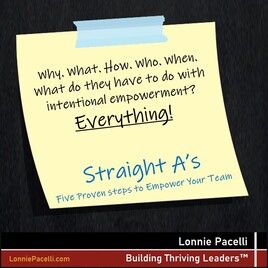0 Comments
 One day, my wife Patty and I were eating lunch when she said, “I’ve been seeing some social media posts about mental load; have you ever heard of it?” “No,” I answered, wondering if I’ve been missing out. She then told me more about what she’s seen and its impact on people. Intrigued by the term and her explanation, I decided to do a bit more research on mental load. Here’s a little of what I learned from healthline.com: Read more at ProjectManagement.com. Micromanage: to manage or control with excessive attention to minor details Source: dictionary.com  I’ve been a micromanager, been micromanaged, and advised clients on how to avoid micromanaging and being micromanaged. To help peel back the onion on micromanagement and what to do about it, I’d like to start with a concept in my book, Straight A’s, that empowers followers. The Straight A’s focus on five core steps, as follows:
For this to work, both the leader and the follower have to do their parts in each step of the process. For each of the steps, here are responsibilities for both leaders and followers: Read more at ProjectManagement.com.  Feedback is a huge part of what I do in my daily life. I give feedback in my role as a consultant to help my client do something better or avoid something bad. Early in my career, I began learning about right and wrong ways to provide feedback. Sometimes I did it okay, other times I really booted it. As a professional, spouse, parent and now grandparent, I’m still learning about how to provide feedback—when to give it, and when to keep my mouth shut. I adopted the mantra, “My job is to tell you what I think; yours is to decide what to do with it.” It gives me freedom to constructively speak my mind, while acknowledging the recipient may or may not use what I told them. When I started writing, I got a better appreciation for the “yours is to decide what to do with it” part of the mantra. I get feedback from you as ProjectManagement.com readers, from book reviewers, and from my editor (who is also my wife). Patty edits virtually everything I write and does an outstanding job of making my work better. Through my career as an author, I had to learn how to be a graceful recipient of feedback—and constructively decide what to do with it. Regardless of how painful the feedback was to hear, I had to recognize it was for my own good. There are four paths a feedback recipient could take: Read more at ProjectManagement.com |
Topics
All
Reprints
Contact Lonnie about article reprints. Please specify article you wish to reprint. Backlist
See Lonnie's Amazon Author Page Archives
July 2024
|
Lonnie Pacelli - Building Thriving Leaders™
Insightful | Creative | Direct Advice to Help Leaders Help Themselves
Keynote Speaker | Board Director | Autism Advocate | Author | Project Management Expert | Microsoft/Accenture Veteran
See his books on Amazon
Insightful | Creative | Direct Advice to Help Leaders Help Themselves
Keynote Speaker | Board Director | Autism Advocate | Author | Project Management Expert | Microsoft/Accenture Veteran
See his books on Amazon
Services |
About
|
© COPYRIGHT 2019. ALL RIGHTS RESERVED.
We are a participant in the Amazon Services LLC Associates Program, an affiliate advertising program designed to provide a means for us to earn fees by linking to Amazon.com and affiliated sites.
|



 RSS Feed
RSS Feed